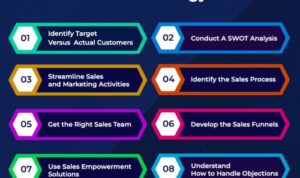Customer Success Tips sets the stage for this enthralling narrative, offering readers a glimpse into a story that is rich in detail with american high school hip style and brimming with originality from the outset.
In the world of business, customer success is a key factor that can make or break a company’s reputation. From establishing strong relationships to leveraging technology, these tips will guide you on the path to success.
Importance of Customer Success: Customer Success Tips
Customer success is like the secret sauce that keeps businesses thriving in the competitive market. It’s all about ensuring that customers achieve their desired outcomes while using the product or service, which ultimately leads to customer satisfaction and loyalty.
Impact on Brand Loyalty
Investing in customer success can have a major impact on brand loyalty. When customers feel supported, valued, and successful in using a product or service, they are more likely to stick with the brand for the long haul. This loyalty can result in repeat business, positive word-of-mouth referrals, and even advocacy for the brand.
- Providing personalized support and guidance to customers can build trust and strengthen the relationship between the customer and the brand.
- Ensuring customers achieve their desired outcomes can create a sense of accomplishment and satisfaction, leading to a positive perception of the brand.
- Responding promptly to customer needs and feedback can show that the brand truly cares about its customers, fostering a sense of loyalty and commitment.
Long-Term Growth
Customer success is not just about short-term gains; it’s about setting the foundation for long-term growth and sustainability. By investing in customer success, businesses can create a loyal customer base that continues to support the brand over time, resulting in steady growth and profitability.
- Retaining existing customers through successful outcomes and support can lead to increased customer lifetime value and revenue.
- Reducing churn rates by ensuring customer success can save costs associated with acquiring new customers and re-acquiring lost ones.
- Building a reputation for excellent customer service and support can attract new customers and expand the brand’s reach in the market.
Strategies for Effective Customer Success

Developing a customer success strategy is crucial for retaining customers and driving business growth. By implementing best practices, focusing on personalized experiences, and leveraging data analytics, companies can optimize their customer success initiatives to ensure long-term success.
Best Practices for Developing a Customer Success Strategy
- Establish clear goals and objectives for customer success.
- Build a customer-centric culture within the organization.
- Provide ongoing training and support for customer success teams.
- Regularly collect feedback and measure key performance indicators.
Personalized Customer Experiences, Customer Success Tips
Personalized customer experiences play a significant role in enhancing customer success. By tailoring interactions and solutions to meet individual customer needs, businesses can foster long-lasting relationships and loyalty.
The Role of Data Analytics
Data analytics is essential for optimizing customer success initiatives. By analyzing customer data, businesses can gain valuable insights into customer behavior, preferences, and pain points. This data-driven approach allows companies to make informed decisions and continuously improve their customer success strategies.
Building Strong Customer Relationships
Building strong relationships with customers is crucial for the success of any business. It helps in fostering loyalty, increasing customer retention, and driving revenue growth. Effective communication plays a key role in building and maintaining these relationships. Here are some tips on how to do it right:
Effective Communication Tips:
- Listen actively to your customers to understand their needs and concerns.
- Be responsive and provide timely solutions to their queries or issues.
- Personalize your interactions to make customers feel valued and appreciated.
- Use multiple communication channels such as email, phone, and social media to stay connected.
- Solicit feedback regularly to show customers that their opinions matter.
Successful Customer Relationship Management Examples:
Amazon’s personalized product recommendations based on past purchases have significantly enhanced customer satisfaction and loyalty.
Zappos’ legendary customer service, which includes free shipping and returns, as well as a 24/7 customer support line, has set a high standard for customer relationship management in the e-commerce industry.
Leveraging Technology for Customer Success

In today’s digital age, leveraging technology is essential for enhancing customer success efforts. By utilizing various tools and platforms, businesses can effectively manage customer relationships and streamline processes to ensure customer satisfaction.
Benefits of Using CRM Systems
- Centralized Customer Data: CRM systems allow businesses to store all customer information in one place, making it easy to access and analyze.
- Improved Communication: By tracking customer interactions and preferences, businesses can personalize communication and provide tailored solutions.
- Enhanced Customer Service: CRM systems enable quick response times and efficient issue resolution, leading to improved customer satisfaction.
- Data Analysis: Businesses can use CRM data to identify trends, predict customer behavior, and make informed decisions to enhance customer success.
AI and Automation in Customer Success
- Efficiency: AI and automation can handle routine tasks, freeing up time for customer success teams to focus on building relationships and providing value-added services.
- Personalization: AI algorithms can analyze customer data to deliver personalized recommendations and solutions, enhancing the overall customer experience.
- Scalability: Automation allows businesses to scale their customer success efforts without compromising quality, ensuring consistent service delivery across a growing customer base.
- Proactive Support: AI-powered tools can detect potential issues before they arise, enabling businesses to address concerns proactively and prevent customer dissatisfaction.





